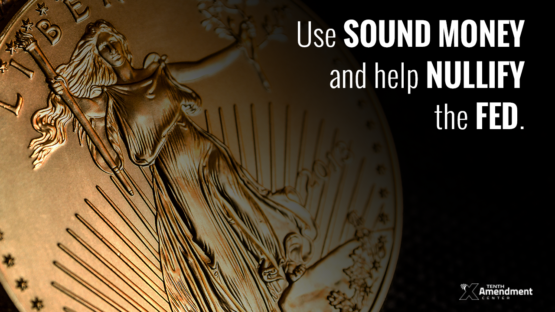New Wyoming Legal Tender Law Recognizes Gold and Silver as Money
Gold and silver are money. But most governments treat precious metals like a commodity. They don’t accept it as payment. Worse than that, they tax it. Think about the absurdity of this policy. You don’t tax money!
Fortunately, we’re beginning to see a shift. Many states are repealing taxes on gold and silver, and treating precious metals more like money. Wyoming is the latest state to reform its laws.
These policies not only ease the burden on investors, it opens the door to use gold and silver in everyday transactions, a foundational step for the people to undermine the Federal Reserve’s monopoly on money.
Last week, a Wyoming bill that defines gold and silver specie as legal tender and eliminates all taxes levied on it became law without the governor’s signature.
A bipartisan coalition of 11 Republicans sponsored House Bill 103. Titled the Wyoming Legal Tender Act, the new law defines gold and silver specie as “legal tender,” meaning it will be recognized as a medium of exchange for the payment of debts and taxes in the state. Practically speaking, gold and silver specie will be treated as money, putting it on par with Federal Reserve notes in the state.
The law defines specie as coins having gold or silver content, or refined bullion, coined, stamped or imprinted with its weight and purity.
HB103 also prohibits the state or local governments from levying any property, sales of capital gains taxes on gold or silver specie. Wyoming does not have an income tax. However, it does have a sales tax and it assesses this tax against precious metals bullion
The Senate passed HB103 with some technical amendments by a 25-5 vote. The House previously passed HB103 by a 44-14 vote. Last Wednesday, the bill became law without Gov. Matt Mead’s signature. It will go into effect July 1, 2018.
Two weeks ago, Alabama Gov. Kay Ivey signed a bill into law exempting the sale of gold and silver bullion from state sales and use tax. A similar measure is moving through the Kansas legislature.
In Practice
Imagine if you asked a grocery clerk to break a $5 bill and he charged you a 35 cent tax. Silly, right? After all, you were only exchanging one form of money for another. But that’s essentially what taxes on gold and silver bullion do. By removing the taxes on the exchange of gold and silver, Wyoming will treat specie as money instead of a commodity. This represents a step toward reestablishing gold and silver as legal tender and breaking down the Fed’s monopoly on money.
Ron Paul has been a vocal supporter of this movement. He produced a video urging the Wyoming governor to sign HB103 into law. He noted that things move agonizingly slow in Washington D.C. Passing bills like this at the state level are an important step toward real monetary reform.
“It’s just to me sad that we are so far removed from the Constitution. But a little bit here and a little bit there, there is going to be a revolution in monetary policy.”
Paul emphasized that monetary reform is an important step toward reducing the power of the federal government.
“Believe me, the size and scope and interference of government would change a whole lot if we could rein in the monetary system, rein in the Federal Reserve and rein in this spending.”
Paul also testified during in support of a bill to eliminate capital gains taxes on gold and silver that passed in Arizona last year.
We ought not to tax money – and that’s a good idea. It makes no sense to tax money.”
“Paper is not money, it’s fraud,” he continued.
The new laws in Wyoming and Alabama take an important first step toward currency competition. If sound money gains a foothold in the marketplace against Federal Reserve notes, the people would be able to choose the time-tested stability of gold and silver over the central bank’s rapidly-depreciating paper currency. The freedom of choice expanded by these laws give Wyoming and Alabama residents the opportunity to secure the purchasing power of their money.
Practically speaking, eliminating taxes on the sale of gold and silver lower the cost of investing in precious metals. That’s a win right there. But it also cracks open the door for people to begin using specie in regular business transactions. This will mark an important small step toward currency competition. If sound money gains a foothold in the marketplace against Federal Reserve notes, the people will be able to choose the time-tested stability of gold and silver over the central bank’s rapidly-depreciating paper currency.
Background Information
The United States Constitution states in Article I, Section 10, “No State shall…make any Thing but gold and silver Coin a Tender in Payment of Debts.” States have simply ignored this constitutional provision for years. It’s impossible for a state to return to a constitutional sound money system when it taxes gold and silver as a commodity.
These tax repeals take a small step toward that constitutional requirement, ignored for decades in every state. Such a tactic would set the stage to undermine the monopoly of the Federal Reserve by introducing competition into the monetary system.
Constitutional tender expert Professor William Greene said when people in multiple states actually start using gold and silver instead of Federal Reserve Notes, it would effectively nullify the Federal Reserve and end the federal government’s monopoly on money.
“Over time, as residents of the state use both Federal Reserve notes and silver and gold coins, the fact that the coins hold their value more than Federal Reserve notes do will lead to a “reverse Gresham’s Law” effect, where good money (gold and silver coins) will drive out bad money (Federal Reserve notes). As this happens, a cascade of events can begin to occur, including the flow of real wealth toward the state’s treasury, an influx of banking business from outside of the state – as people in other states carry out their desire to bank with sound money – and an eventual outcry against the use of Federal Reserve notes for any transactions.”
Once things get to that point, Federal Reserve notes would become largely unwanted and irrelevant for ordinary people. Nullifying the Fed on a state by state level is what will get us there.
The enactment of the Alabama bill and passage of the Wyoming Legal Tender Act are part of a broader movement as states continue to pass measures that chip away at the Federal Reserve’s monopoly on money by facilitating and encouraging the use of gold and silver.
This article was based on reporting by the Tenth Amendment Center.




 Since Nayib Bukele became president of El Salvador, El Salvador has been in American media and global political discussion more than ever. While much of the attention focuses on Bukele’s mass incarceration of gang members and a decline in homicide of over 70%, Bukele has also drawn attention to his favoritism towards Bitcoin and how he […]
Since Nayib Bukele became president of El Salvador, El Salvador has been in American media and global political discussion more than ever. While much of the attention focuses on Bukele’s mass incarceration of gang members and a decline in homicide of over 70%, Bukele has also drawn attention to his favoritism towards Bitcoin and how he […] With gold hitting yet another awe-inspiring all-time high in the wake of Powell’s remarks reassuring markets (more or less) to expect rate cuts in 2024, a few analysts are pointing out risk factors for a correction — so is there really still room to run?
With gold hitting yet another awe-inspiring all-time high in the wake of Powell’s remarks reassuring markets (more or less) to expect rate cuts in 2024, a few analysts are pointing out risk factors for a correction — so is there really still room to run? Gold hit a new all-time nominal high, surpassing the previous record set in December of the previous year. The precious metal’s price reached approximately $2,140, indicating a robust and continuing interest in gold as a safe-haven asset, despite a rather peculiar lack of fanfare from the media and retail investors. This latest peak in gold […]
Gold hit a new all-time nominal high, surpassing the previous record set in December of the previous year. The precious metal’s price reached approximately $2,140, indicating a robust and continuing interest in gold as a safe-haven asset, despite a rather peculiar lack of fanfare from the media and retail investors. This latest peak in gold […] The gold price has been surging, with unprecedented central bank demand gobbling up supply. It has been a force to behold — especially as US monetary policy has been relatively tight since 2022, and 10-year Treasury yields have rocketed up, which generally puts firm downward pressure on gold against USD.
The gold price has been surging, with unprecedented central bank demand gobbling up supply. It has been a force to behold — especially as US monetary policy has been relatively tight since 2022, and 10-year Treasury yields have rocketed up, which generally puts firm downward pressure on gold against USD.  Total gold demand hit an all-time high in 2023, according to a recent report released by the World Gold Council. Last week, the World Gold Council (WGC) released its Gold Demand Trends report, which tracks developments in the demand for and use of gold around the world. Excluding over-the-counter (OTC) trade, 2023 gold demand fell slightly from 2022 […]
Total gold demand hit an all-time high in 2023, according to a recent report released by the World Gold Council. Last week, the World Gold Council (WGC) released its Gold Demand Trends report, which tracks developments in the demand for and use of gold around the world. Excluding over-the-counter (OTC) trade, 2023 gold demand fell slightly from 2022 […]